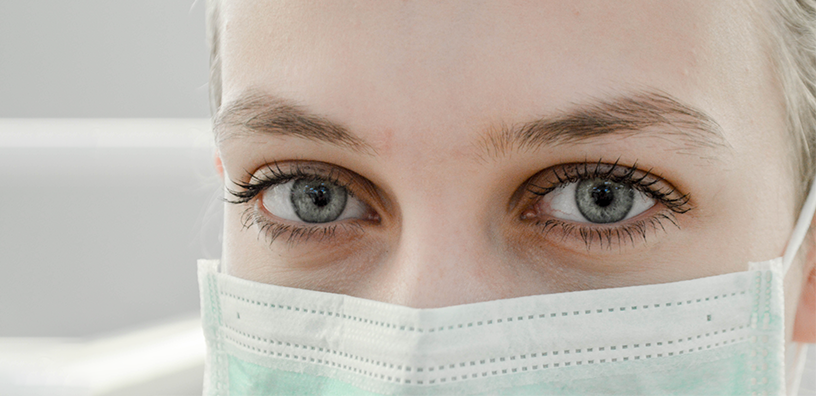
Is Coronavirus Affecting Your Dreams?
Have you ever had a weird dream? Chances are high that if you weren’t having odd dreams before, you certainly are now. With the rise of Coronavirus, sleep professionals have seen an uptick in reports of strange and upsetting dreams. In fact, there has even been a Twitter tag for strange, Corona-induced dreams.* So why are we dreaming more vividly during the global pandemic?

Where do dreams come from?
Before we jump into why some people are dreaming more, let’s discuss where dreams actually come from. Your sleep is made up of four stages: stages 1, 2, 3, and Rapid Eye Movement (REM). While you can dream during any stage of sleep, dreams are most vivid during REM. The REM stage itself is responsible for regulating mood and enhancing cognitive function. You go through this cycle several times throughout the night and have several dreams. More than likely, you’ll only remember one, if any.*

Why do we dream?
There are a multitude of reasons why scientists suspect that we dream. The general consensus is that dreams act as a form of therapy. Your dreams are a safe space for you to act out and work through your real-life problems and fears. That being said, the scenarios that you may experience in your dreams may not be direct reflections of your real-life experiences.*
For example, during the rise of COVID-19, many people reported dreaming of going out in public and forgetting a mask, being attacked by swarms of creepy crawlers, or even catching a deathly illness. While these dreams seem far fetched, in reality, they can be incredibly traumatizing, often disrupting the brain so badly that falling asleep again feels impossible.*
Why are we having more pandemic-related nightmares?
Your dreams and nightmares can be a direct result of the world around you.* The fear of catching something paired with constant news updates with high case numbers is enough to make anyone sick with anxiety. That anxiety fuels your brain, resulting in gruesome nightmares and short, disturbed sleep. This short, disturbed sleep in turn leads to insomnia, heightening your susceptibility to anxiety, and the whole cycle begins again.*

How can we break the cycle of anxiety?
Though you can’t exactly make the source of your anxiety go away (i.e. the pandemic), you can take steps to reduce your anxiety and increase your bedtime relaxation.
First, turn off the news. It’s important during this time to be aware of the changing world, but your self-care is important. Two to three hours before bed, turn off the news, log off social media, and silence notifications. Your brain needs time to decompress before bed. Instead, pick up a book, listen to music, or watch a movie.
Next, develop a routine that works for you. The routine of the world has been turned on its head, which has thrown our bodies out of order. Create a new routine. An example might be turning off electronics two hours before bed, changing in pajamas, cleaning up, and hopping in bed to read your favorite book. If you plan to go to bed and wake up at the same time each day, your body will once again become accustomed to structure, limiting your anxiety.
Last, choose bedding that helps you relax. Our favorite is the Cosy House Luxury Bed Sheets. They’re made of a premium bamboo viscose blend that wicks away moisture, keeping you cool throughout the night. They’re even cooler than cotton! On top of that, they’re hypoallergenic, resisting odors, stains, common household non-living allergens, and more. You’ll spend less time doing laundry and more time sleeping.
The reality is we don’t know how long this pandemic will last. That doesn’t mean your sleep has to suffer. Invest in rest and take the steps you need to develop healthy sleep habits.
We've gone ahead & enclosed a 10% off coupon below for you to use if you'd like to take the plunge and try out our sheets for yourself! To shop our collection & get 10% OFF Use the code 'BLOG10' at checkout.
Resources:
Scarpelli, S., Nadorff, M. R., Bjorvatn, B., Chung, F., Dauvilliers, Y., Espie, C. A., Inoue, Y., Matsui, K., Merikanto, I., Morin, C. M., Penzel, T., Sieminski, M., Fang, H., Macêdo, T., Mota-Rolim, S. A., Leger, D., Plazzi, G., Chan, N. Y., Partinen, M., De Gennaro, L. (2022, January 24). Nightmares in people with covid-19: Did coronavirus infect our dreams? Nature and science of sleep. Retrieved from https://www.ncbi.nlm.nih.gov/pmc/articles/PMC8800372/#:~:text=Our%20work%20shows%20strong%20associations,activity%20and%20quality%20of%20life.
Team, B. and S. (2020, September 29). Why do we dream? A sleep expert answers 5 questions. Cleveland Clinic. Retrieved from https://health.clevelandclinic.org/why-do-we-dream-a-sleep-expert-answers-5-questions/#:~:text=Most%20dreaming%20occurs%20during%20REM,and%20the%20forebrain%20generates%20dreams.
Roland, J. (2017, August 22). Why do we dream? the role of dreams and nightmares. Healthline. Retrieved from https://www.healthline.com/health/why-do-we-dream#:~:text=Dreams%20as%20memory%20aides,that%20sleep%20helps%20store%20memories.
Katella, K. (2020, July 24). Covid-19 dreams? here's what they mean. Yale Medicine. Retrieved from https://www.yalemedicine.org/news/covid-dreams.

